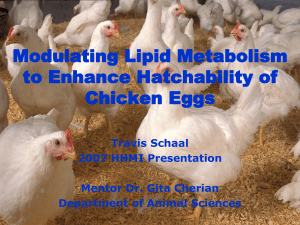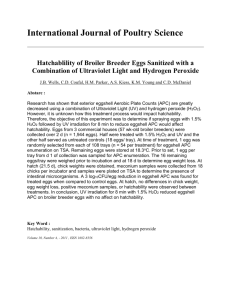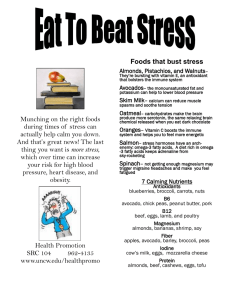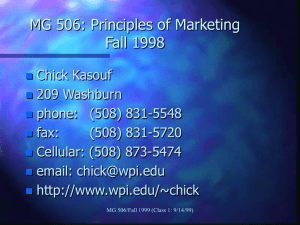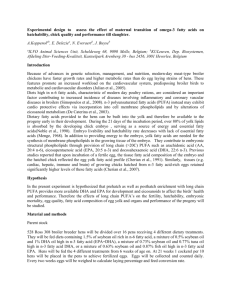Modulating Fatty Acid Metabolism to Enhance Hatchability of Chicken Eggs Travis Schaal
advertisement
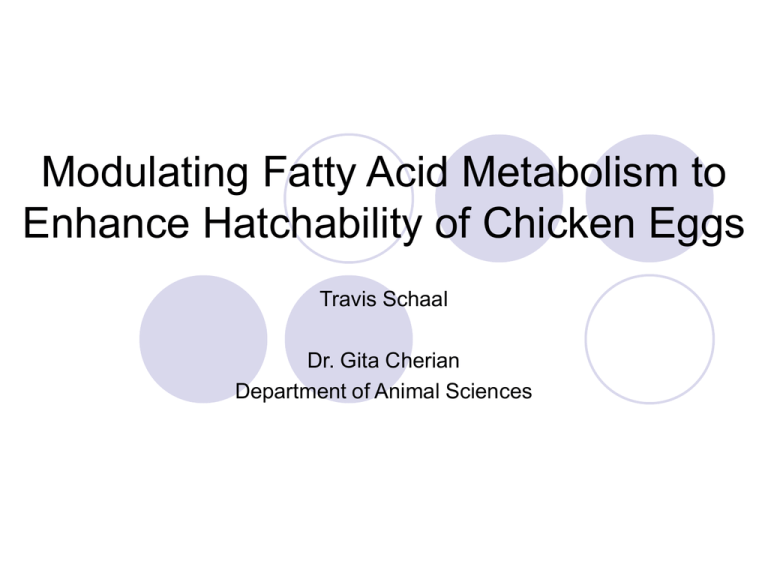
Modulating Fatty Acid Metabolism to Enhance Hatchability of Chicken Eggs Travis Schaal Dr. Gita Cherian Department of Animal Sciences Background Chicken egg incubation lasts 21 days 12 billion broiler and turkey eggs incubated commercially in US annually 20% of eggs incubated do not hatch USDA Image Number:95CS1974 12 85 10 80 8 75 6 70 4 65 2 60 0 55 1985 1990 1995 2000 % Hatchability Billions of Eggs Background Eggs Set Hatchability 2005 Year Schaal and Cherian, 2005 Hatchability resulted in 500 million dollar loss to the US poultry industry in 2005 Background Embryos are dependent upon nutrients stored in the egg for sustaining growth and development An average chicken egg contains 5.5 to 6 g of fat (yolk) Lipid-rich yolk is the only source of fatty acids available to the developing embryo. USDA Image Number:95cs1973 Background During incubation, over 80% of yolk fatty acids (FA) are absorbed by the developing chick embryo. In addition, FA are the major fuel and provides over 70 percent of the energy requirements for chick’s heart. USDA Image Number: 97cs0748 Hatching A Stressful Act Hatching is characterized by: The internal pipping by the beak, accompanied by a gradual shift from yolk sac-based respiration to pulmonary respiration Purpose To determine the effect of exogenous supply of fatty acids on chicken embryo health and hatchability. Hypothesis Embryos having an exogenous supply of fatty acids will produce more energy during the stressful process of hatching and will have a higher hatchability rate Methods - In Ovo Injection Two trials conducted Practice technique Trial 1 A total of 72 eggs were injected in-ovo with fatty acids (0.2 ml) or saline at day 14 of incubation with trans fat, no trans fat, or saline. Methods - Trial 2 A total of 135 eggs were incubated, 90 eggs were injected in-ovo with fatty acids (Palmitate, 0.2 ml) or carrier at day 15 of incubation. Methods Eggs set in same tray in the same incubator. Incubation conditions: 37.5°C dry and 28.3°C wet bulb until hatching when the dry bulb temperature will be reduced to 36.3°C and the wet bulb temperature will be increased to 30.2°C. Injection Methods Methods Hatched chicks were counted. Non-hatched eggs were broken open to determine the embryo status (infertile, early or late dead). Methods Hatched chicks were sacrificed and tissues/blood collected for FA assays. Heart = oxidation Liver = synthesis Brain = tissue with high levels FA Yolk sac = reservoir Results – Trial 1 Hatchability Saline = 80% Trans fats = 29.6% No trans fats = 45% Tissue and blood FA assays pending Results Under Construction Results – Trial 2 Hatchability Trial 2 Palmitate = 64% Carrier = 54% No injection = 81% Tissue and blood FA assays pending Results – Trial 2 Effect of injection on hatched chick weight 48 (gm) 46 44 42 40 38 Control Palmitate Non-Inj Results - Trial 2 Effect of injection on hatched chick heart weight 0.72 Body weight (%) 0.7 0.68 0.66 0.64 0.62 0.6 Control Palmitate Non-Inj Results – Trial 2 Effect of injection on hatched chick yolk sac weight 18.00 Body weight (%) 16.00 14.00 12.00 10.00 8.00 6.00 4.00 2.00 0.00 Control Palmitate Non-Inj Results – Trial 2 Effect of injection on hatched chick liver weight 2.40 Body weight (%) 2.30 2.20 2.10 2.00 1.90 1.80 Control Palmitate Non-Inj Conclusions Trial 1 Optimization of in-ovo injection techniques In-ovo injection did not affect hatchability Trans fat reduced hatchability Trial 2 Palmitate chick higher body weight (BW) Injected chicks higher heart weight (% BW) Injected chicks higher yolk sac weight (% BW) No effect on liver weight (% BW) So What? Poultry Production Hatchability, Body weight Animal Models Chick embryo could be used as a model to study fatty acid metabolism during early growth in humans Link discovered between fatty acid metabolism sudden infant death syndrome (SIDS) Acknowledgements Howard Hughes Medical Institute Dr. Gita Cherian Dr. Kevin Ahern Mare Goeger
